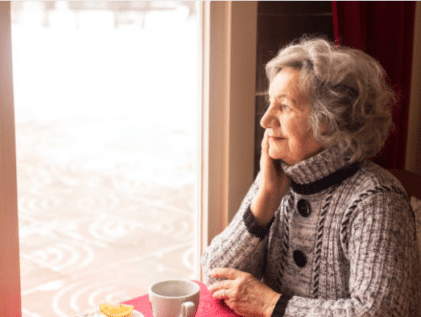Though winter hasn’t officially started yet, the leaves have fallen, the days are shorter and there’s a noticeable nip in the air. With ice, snow, cold temperatures and limited hours of sunlight, the winter months can put older adults at higher risk of injury and illness. Though many seniors may be spending more time at home these days due to the pandemic, it is likely that they will still need to venture out from time-to-time for doctor appointments or to run errands. When you do need to brave the cold, be sure to take certain precautions to avoid the dangers that come along with winter weather.
Help you and your loved one stay happy and healthy this winter with these helpful tips:
Stay Warm
Older adults lose body heat faster than when they were younger and, with age, it may become more difficult to recognize signs that their body is cold. The risk of hypothermia is high for seniors over the age of sixty-five, and a dropping body temperature can cause problems like heart attack, kidney damage, and liver damage. To avoid hypothermia, seniors should spend most of their time indoors and keep the thermostat between 68- and 70-degrees Fahrenheit.
Dress Appropriately
It may seem obvious, but seniors need to add extra layers during the winter months, both indoors and outdoors. When heading out of the home, seniors should wear loose layers of clothing along with a hat, scarf, and gloves. A good quality coat that is waterproof and warm is also a must. When staying home, seniors may want to consider wearing woolen socks and slippers, keeping extra blankets handy, and adding a layer of long underwear under pajamas or bathrobes.
Beware of Falls
Twenty-five percent of seniors over the age of sixty-five fall every year, and falls are the leading cause of fatal and non-fatal injuries for this age group. The risk of falling increases with age as well as in the colder months. As the winter approaches, seniors should make sure that they have shoes with good traction and non-slip soles. If your loved one uses a cane, replace the tip on it each winter to ensure that it won’t slip. For seniors living at home, be sure that their driveways, pathways, and outdoor stairs are regularly cleared of snow and ice. If your loved one is not very mobile, encourage them to stay home as much as possible and make their life easier with grocery delivery services or by accompanying them to important appointments.
Stay COVID-19 and Flu Free
Seniors are more susceptible to the flu and coronavirus due to their weakening immune systems or if they have pre-existing health conditions. There are several steps that seniors should take to stay healthy this winter:
- Stay home as much as possible and avoid spending time in public places.
- Get the flu vaccine. Geriatric physicians recommend seniors get the high dose flu vaccine.
- Wash hands often and use hand sanitizer.
- Eat a healthy and varied diet to support a strong immune system.
- Get regular exercise. Exercise improves the function of white blood cells, which fight infection and improve the immune system.
If your loved one needs a bit more assistance and company during the winter months, a winter stay at a senior living community may be worth considering. Planning for the upcoming winter season will ensure that your loved one stays happy, healthy, and safe.

